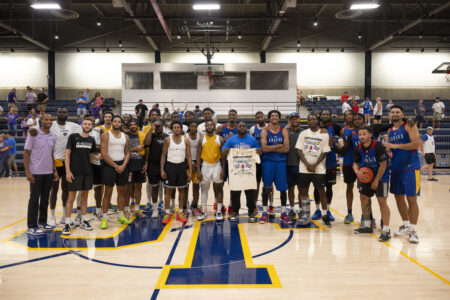Rams countered trees with treys
Winston-Salem State, subconsciously, figured out it had no choice.
With Kansas University’s basketball team towering over the Rams’ post players, gobbling up the paint with wingspan and athleticism, Winston-Salem had to resort to firing three-pointer after three-pointer in a 94-43 loss Tuesday in Allen Fieldhouse.
But judging by KU’s final tally, Winston-Salem would’ve needed about 35 treys to get it done. It got only eight.
“I told them at halftime, we only have three two-point baskets,” Rams coach Bobby Collins said. “But they were so big on the inside, we couldn’t get anything. My post men are 6-4 and 6-5.”
Compared to 6-foot-11 Sasha Kaun, 6-9 Darrell Arthur and 6-8 Darnell Jackson, the Rams were in deep trouble from the opening tip. So they stayed outside, worked the ball around the perimeter and shot nearly half their shots from downtown – many contested.
Darius Floyd finished with a game-high 17 points, all but two coming off of three-pointers. He attempted 10 treys on the night, often trying to draw a foul while getting it off.
“We were trying to play more team ball, work the ball around the perimeter, get it inside and get the big man the ball,” Floyd said. “But we had to shoot the three just to get back in the game.”
The deficit turned out to be like quicksand, considering Kansas is tradition-rich and in the Top 25, while Winston-Salem State is in Division-I transition and 1-14 this season.
No one can question the Rams’ scrappiness, though. Playing hard from player introductions to final horn led to three intentional fouls and a technical foul, but the inferior WSSU team trailed just 15-13 some 71â2 minutes into the game.
But, like everyone expected, the Jayhawks (9-2) razzle-dazzled their way to an easy nonconference victory on their home floor. No matter what the Rams tried Tuesday, there really wasn’t all that much they could do.
“We were outmanned,” Collins said.
The Rams’ first-year coach then tried to elaborate, though he realized mid-sentence there really wasn’t any need.
“Obviously,” he said, “they’re : they’re Kansas.”







